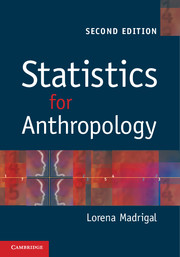Book contents
- Frontmatter
- Contents
- List of partial statistical tables
- Preface
- 1 Introduction to statistics and simple descriptive statistics
- 2 The first step in data analysis
- 3 Probability and statistics
- 4 Hypothesis testing and estimation
- 5 The difference between two means
- 6 The analysis of variance (ANOVA)
- 7 Non-parametric tests for the comparison of samples
- 8 The analysis of frequencies
- 9 Correlation analysis
- 10 Simple linear regression
- 11 Advanced topics in regression analysis
- References
- Index
11 - Advanced topics in regression analysis
Published online by Cambridge University Press: 05 June 2012
- Frontmatter
- Contents
- List of partial statistical tables
- Preface
- 1 Introduction to statistics and simple descriptive statistics
- 2 The first step in data analysis
- 3 Probability and statistics
- 4 Hypothesis testing and estimation
- 5 The difference between two means
- 6 The analysis of variance (ANOVA)
- 7 Non-parametric tests for the comparison of samples
- 8 The analysis of frequencies
- 9 Correlation analysis
- 10 Simple linear regression
- 11 Advanced topics in regression analysis
- References
- Index
Summary
This chapter covers topics which are frequently found in another category of textbooks directed to a different audience than that for which this textbook is written. Indeed, there are numerous and excellent “second-level” textbooks on advanced regression analysis (Dielman 2005; Draper and Smith 1998; Hocking 2003; Mendenhall and Sincich 2003; Ryan 2009); my purpose is not to compete with them in this single chapter. My purpose is limited to introducing the reader to two advanced regression applications frequently used in anthropology: multiple and logistic regression analysis.
The multiple regression model
The transition from simple to multiple regression analysis is not terribly difficult but it is certainly fun. In a multiple regression model we have one dependent variable and several independent variables which are potential predictors of the former. The art of regression model building resides in the analyst's particular choice of independent variables and their transformations into a model that is satisfactory. I call it an art because there is much room for individual choice. It is always fun to ask students to explain why they chose a model, and to hear different proposals for a better model. Not always is there an obvious best choice; sometimes there is considerable room for disagreement.
Information
- Type
- Chapter
- Information
- Statistics for Anthropology , pp. 234 - 256Publisher: Cambridge University PressPrint publication year: 2012
